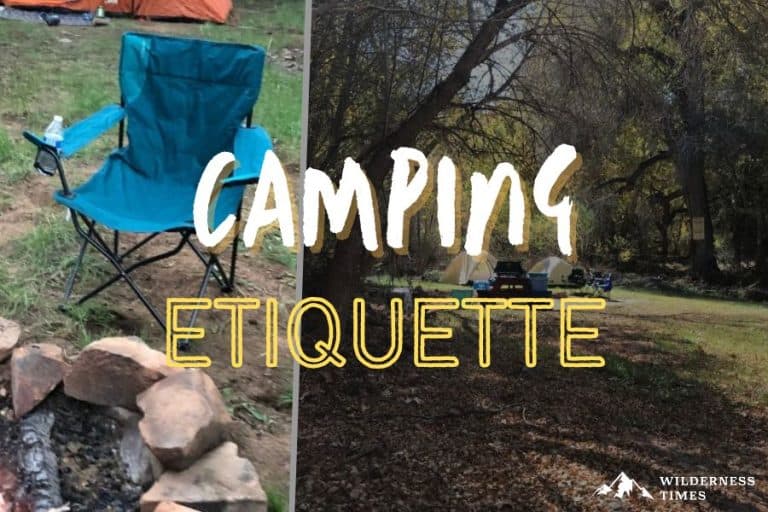Nothing ruins a good camping trip like having bad neighbors.
But that can easily be avoided, as long as everyone follows proper camping etiquette.
Here are all the dos and don’ts of camping:
Camping Etiquette: The Basics
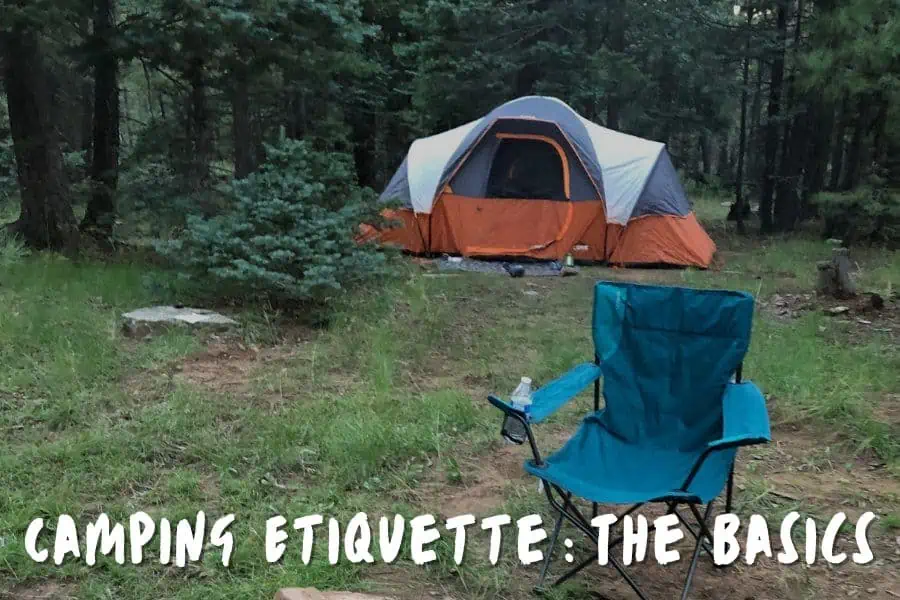
Let’s start with the basics: the most important rules to abide by when camping.
Respect Other Campers
Having a good time is what camping is all about – but only as long as it’s not to the detriment of other campers.
Keep Noise Levels Down
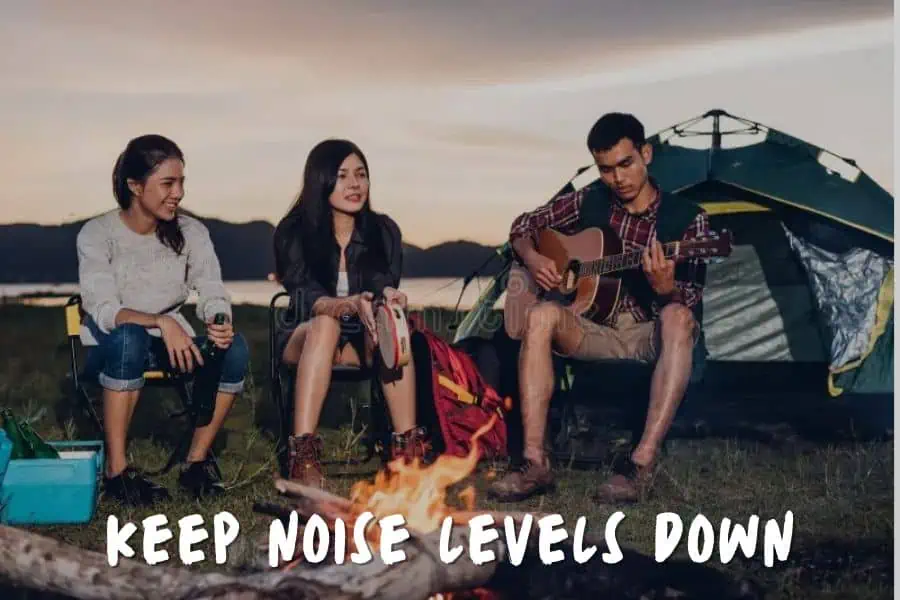
You may be an early bird or a late owl, but your campground neighbors might not have the same sleeping schedule as you.
That’s why it’s important to keep your noise level down so that it doesn’t disturb other people in your vicinity.
By this, I don’t mean you should be whispering your entire stay.
But most campgrounds have “quiet hours”, so you should be making as little noise as possible during that time.
Of course, you can play music and be louder during the day. But that still doesn’t mean you’re the main DJ for the entire campground.
Keep the volume at medium settings and check with your neighbors that you’re not bothering them.
Respect Each Other’s Privacy
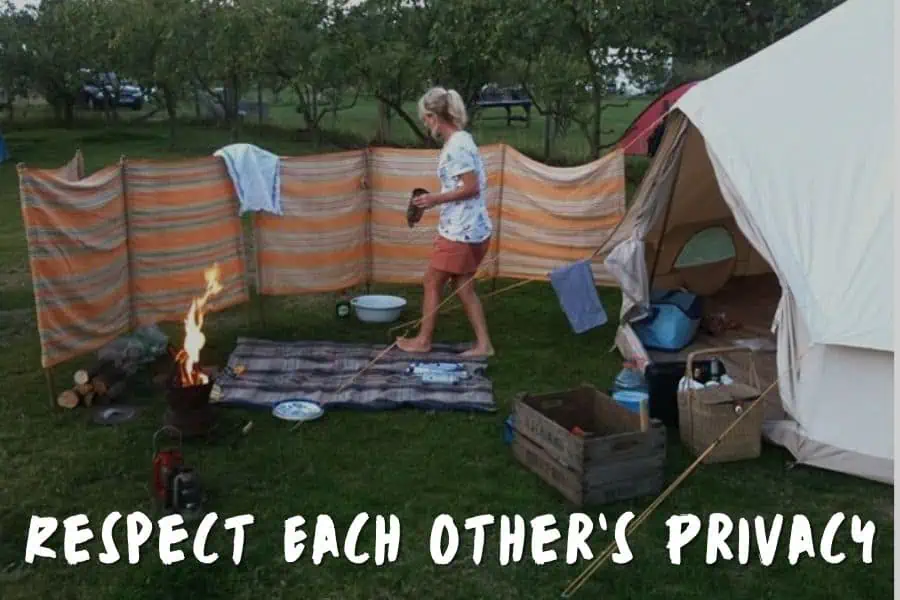
Aside from your tent’s interior, your campsite isn’t exactly very private.
Still, your campsite is your personal space, and that’s true for every camper and their designated campsite.
So, while there’s no fence between you and your neighbors, that doesn’t mean you should cut through someone else’s campsite to get to the bathroom facility faster.
That’s considered an invasion of their personal space, which is pretty rude!
Now, with most campgrounds, you have designated campsite spaces, so you don’t have much choice when situating your camp.
Still, what you can do is not pitch your tent a few inches from your neighbor’s tent.
That is also an invasion of privacy, so it is considered good manners to keep a healthy distance between tents.
That way, both of you can have some privacy at night.
Follow Campground Rules
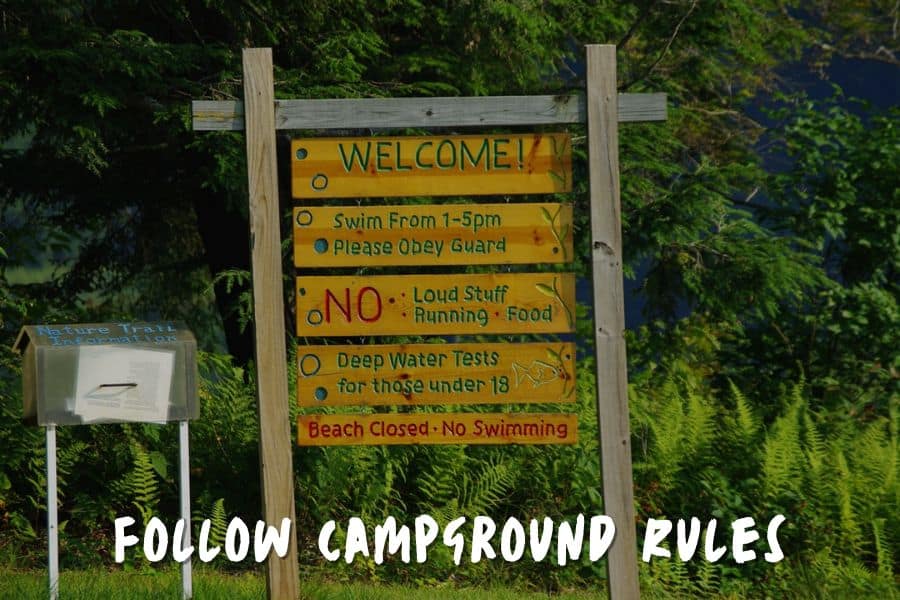
Each campground has a specific set of rules. If you don’t abide by them, you might be asked to leave.
These rules are in place for both your sake and for the sake of others and to make sure the campground is enjoyed by everyone.
These rules can range from quiet hours to safety guidelines, and they are all equally important.
If you don’t follow them, you could not only risk ruining another camper’s trip, but you could be putting yourself or others in danger.
That’s why it’s important to learn the rules for your campground and stick to them.
Observe Campground Quiet Hours
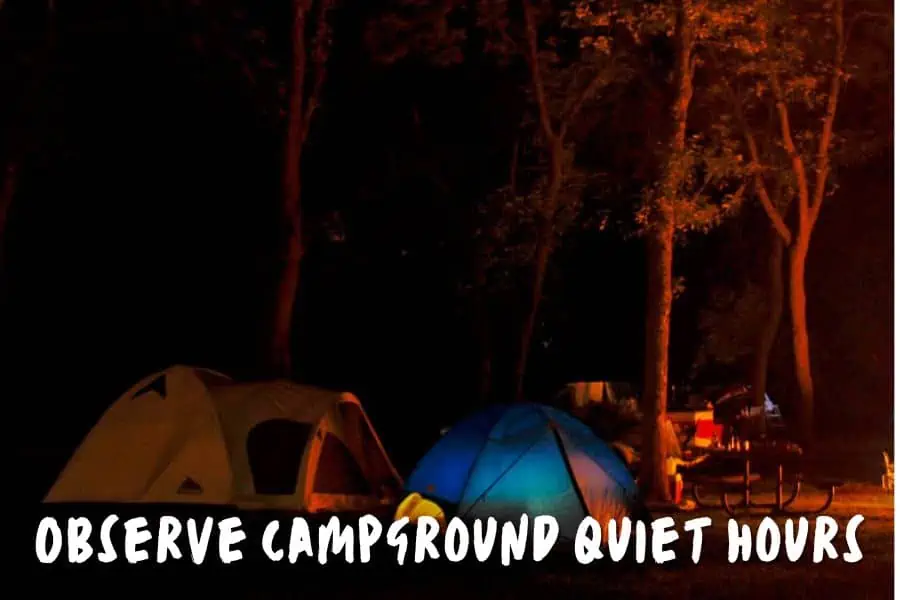
Most campgrounds have quiet hours between 10p.m. and 6a.m. (8a.m. on weekends).
During that time, it’s proper camping etiquette that you keep the noise down.
This means no music, watching movies or playing games with the volume loud enough for the other campers to hear.
The same goes for loud speaking or using generators, as they can make a ridiculously loud noise.
Most campers are sleeping during this time, so you need to be respectful of that.
Stay Within Designated Areas
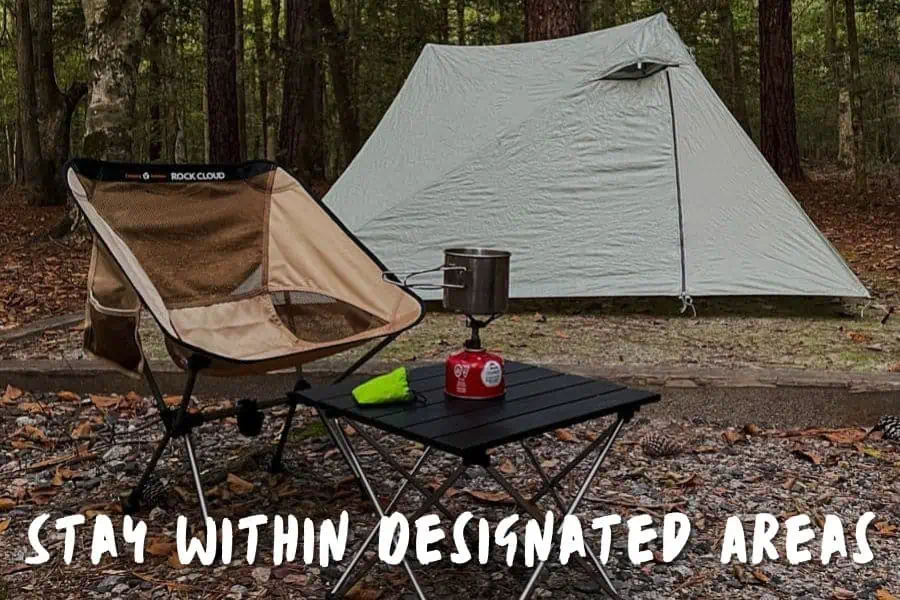
Again, most established campgrounds will have designated campsites, so shouldn’t put your stuff out of your assigned area.
If you do, you might be usurping someone else’s campsite or an area designated for public use.
Therefore, keep your stuff in your own space.
Also, the campground may have restricted areas where campers are not supposed to go.
It is really important to follow these rules because you could risk your safety if you don’t.
Use Fire Rings Only
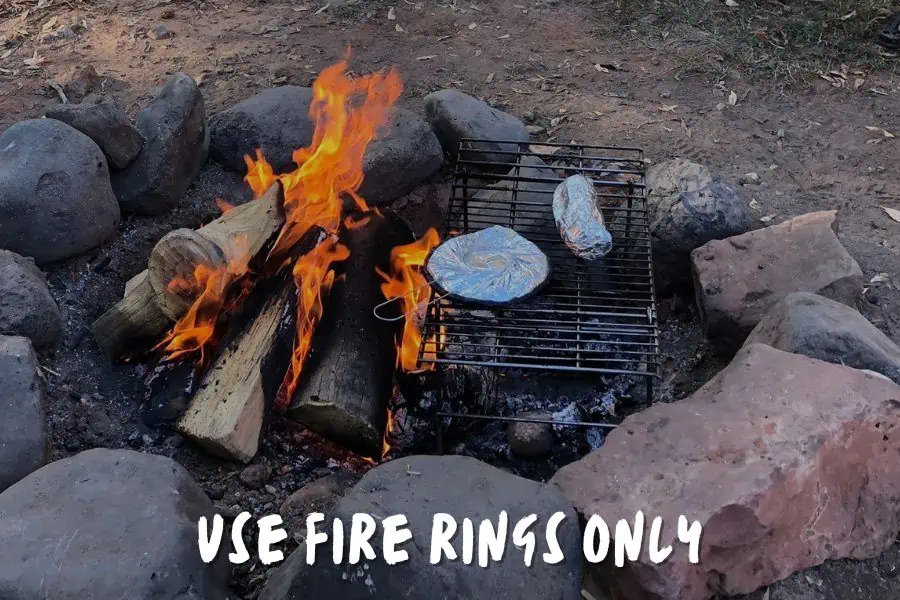
Most campgrounds will provide pre-made fire rings for you to set up a campfire.
This means you should only be making your fires inside that ring.
If they don’t provide one, you should bring your own. Don’t build a fire without one, as you’ll destroy the flora around the area.
It is also a safety risk because they help prevent fires from creeping along dry ground, so keep everyone safe and use a fire ring.
Read: Campfire Safety Tips: How to Stay Safe Around the Campfire
Leave No Trace
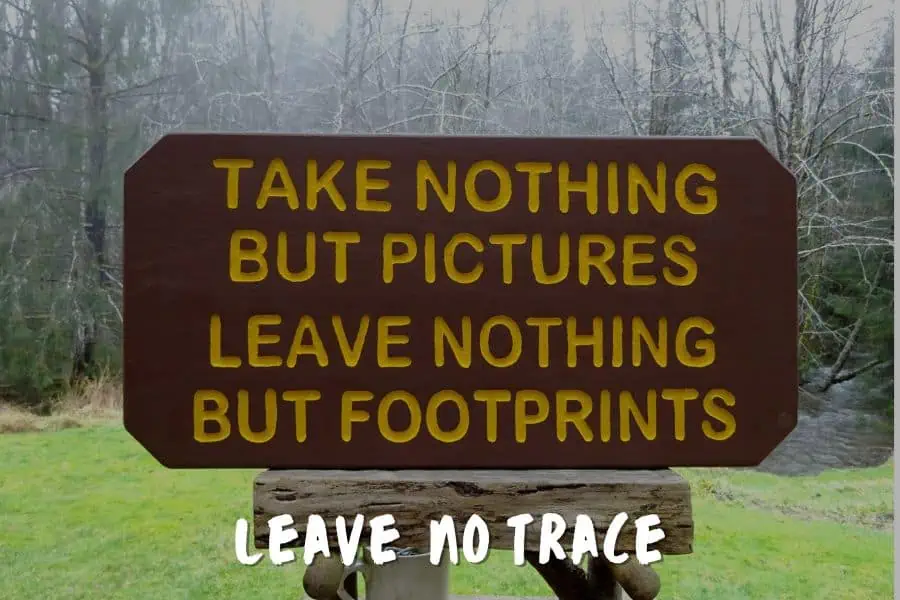
Whenever you’re out in the wilderness – no matter whether you’re hiking, camping, or just enjoying a picnic – it’s important that you minimize your impact on the environment around you.
That way, others who go to the same place in the future can enjoy it in the same way you found it.
That’s why we have Leave No Trace principles, which are set in place so we can preserve nature. When it comes to camping etiquette, these principles are the golden rules.
Here are a few of the things you can do to protect your campsite with these principles:
Keep The Campsite Clean
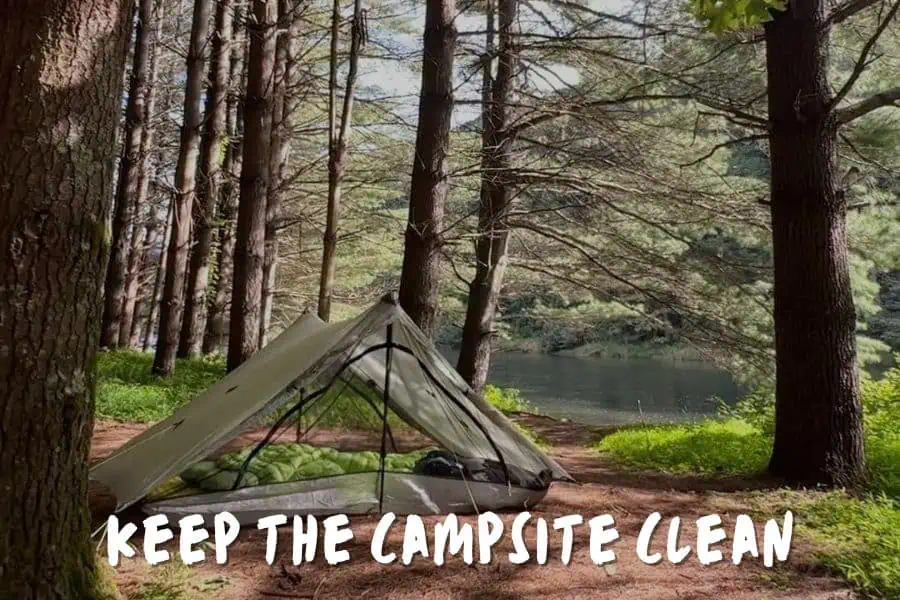
Keep your campsite clean and tidy at all times.
The only time food should be on the table is while you’re preparing or consuming it.
As soon as you’re done cooking and eating, pack leftovers (if there are any) and pack the scraps for disposal.
The same should be done for any kind of trash you have, be it a cigarette bud or food wrapper.
Not only can your garbage pollute the environment, but it can also attract wild animals in search of food.
That’s why it’s important that it ends up in the trash bag, and not on the ground.
Pack Out All Trash (Or Properly Dispose Of It)
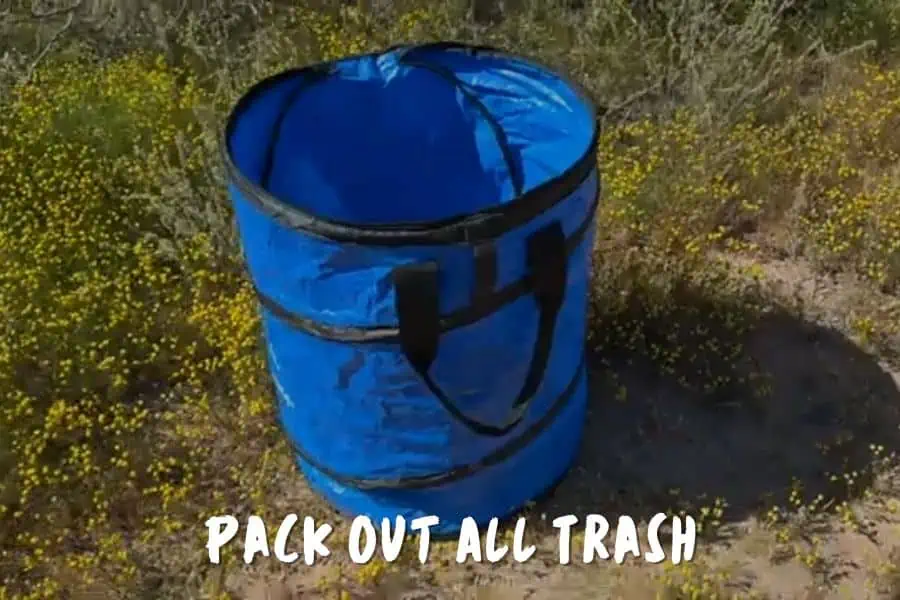
We all know very well how long it can take for certain materials to degrade in nature – especially plastic.
That’s why it’s important to pack out all the trash along with you (we recommend bringing a collapsible camping trash can).
But having to pack your food scraps and “your business” is not always that self-evident.
After all, both should degrade, right? Actually, they don’t degrade that fast.
Well, food scraps deteriorate quickly in a specific environment: a compost heap.
But the terrain you’re camping on is not rich in all the necessary ingredients for fast food decomposition.
Certain food items can take years to break down completely.
Not to mention that the food we eat is usually not safe for wildlife, and certain animals might stumble upon your leftovers.
Therefore, all food scraps and trash should be put in a bag and disposed of properly, not just left to rot in nature (for years to come).
When it comes to doing potty business in nature (and we’re talking #2), that’s also something you should pack with you when you leave.
Your other option is to bury your business in a 6-inch-deep hole, which you can dig before or after business-time.
As for the toilet paper, that should absolutely always go in a trash bag that you’ll dispose of in a designated bin.
Leave Your Campsite As You Found It
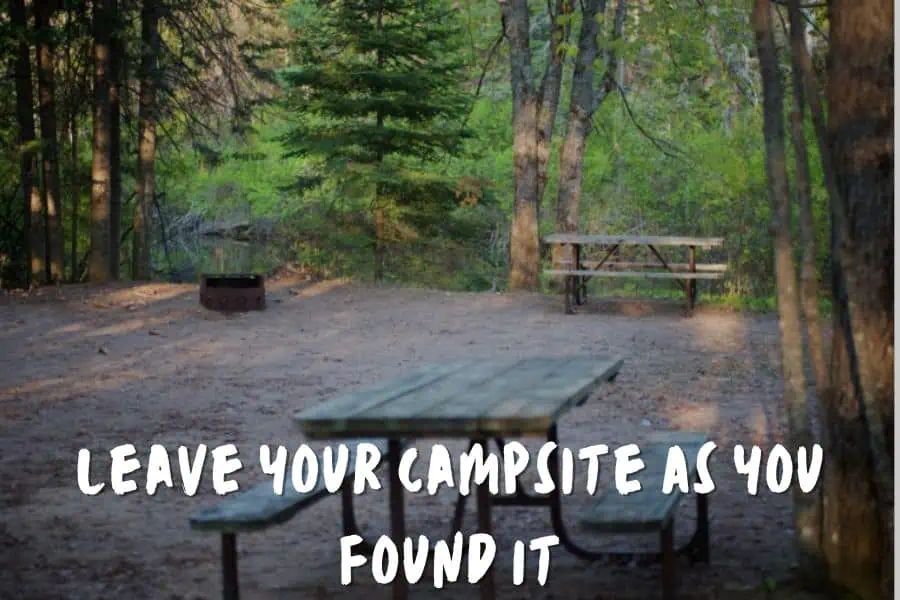
You should never “adjust” nature to your needs.
So, no cutting branches or digging trenches for building campsites.
And, if you’re clearing an area of rocks, twigs, or fallen branches, make sure to put them back in that area when you’re leaving the campsite.
Small insects and critters use them as shelters, so it’s important that you don’t disturb their natural habitat.
You should also keep in mind that, while wildflowers are insanely beautiful, you should stay away from picking them. Even just a few flowers.
Two or three flowers might seem trivial, but imagine if everyone passing through thought the same thing and picked a few.
Eventually, there won’t be as many flowers around for wildlife to enjoy.
Instead, taking a photo is a much better way of keeping memories of that beautiful place.
Be Mindful Of Wildlife
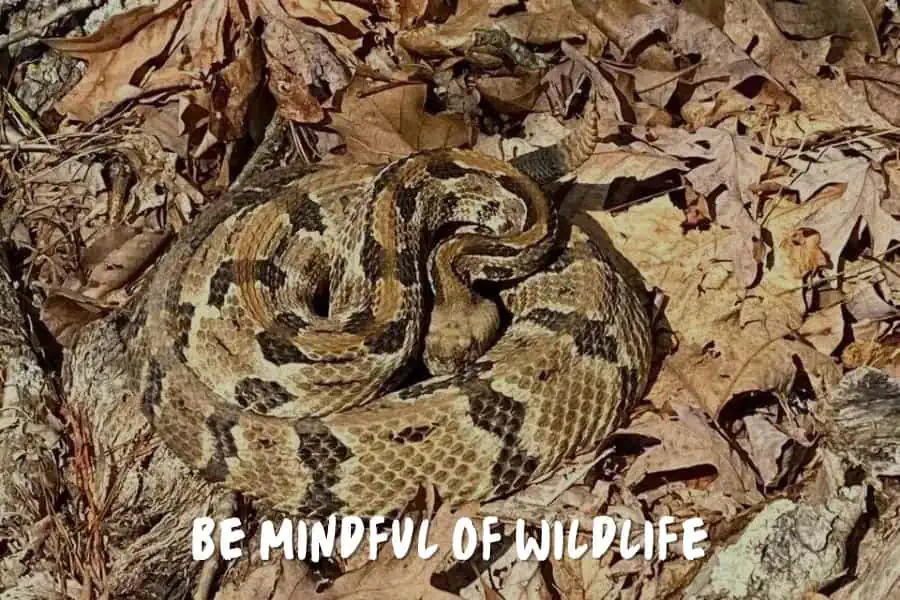
Being well-mannered and following proper camping etiquette is not just for your fellow campers: it’s for all the other creatures, too.
When you’re out in the wilderness, don’t forget that you’re not the only one around.
And while you’re there only for a few days, animals in your surroundings live there permanently.
That’s why it’s important that you’re mindful of wildlife when spending time on their territory.
Keep A Safe Distance
Never approach wildlife. After all, they’re wild animals, so they’re not really used to spending time around people.
And for the most part, they’re always on the lookout. As a result, their behavior can be unpredictable.
Even if they do appear to be friendly, it’s still important to keep your distance.
While they might not know better, you certainly do. And getting wildlife used to people is neither good for them nor for us.
Store Food Properly
Most animals have a way better sense of smell than humans. That means they can smell your dinner as far as a mile away.
And rest assured you don’t want to find a wild animal going around your campsite in search of food.
When hungry, wildlife can be aggressive, and you don’t want to stand between them and the meal.
Don’t Feed Animals
Neither accidentally, nor intentionally, don’t feed wildlife.
First, the food we eat is way different from what they eat, so it can be rather harsh on their stomachs. In fact, certain foods can be toxic to them, like dairy and even avocado!
Not just that, but feeding animals teaches them to not fear humans, which isn’t necessarily a great thing.
Getting free food teaches animals to come back, and that could equal trouble. Again, this can be dangerous for both parties.
Plus, just because you don’t see the trouble, doesn’t mean the people who come after you won’t see it either.
Camping etiquette is just as much about respecting those who come after you as it is about those who are with you.
Overall, it is just best to leave animals alone and as they are.
Read: What To Do When You See A Rattlesnake While Hiking!
Practice Campfire Safety
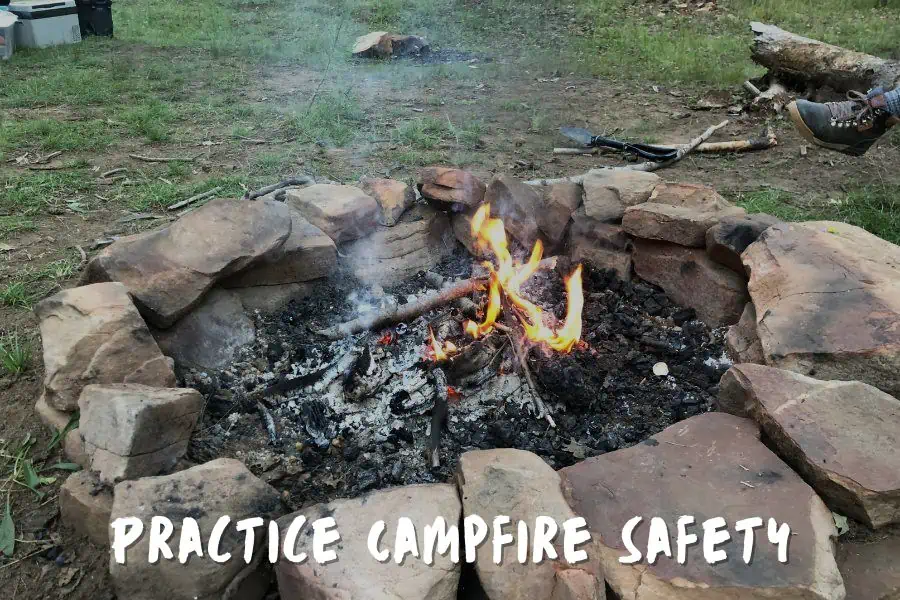
Campfires are an essential part of camping.
But it’s important that you know your campfire etiquette for the safety of the environment and everyone in it.
Leave Wood At Home
If the campground allows open fire, it will usually also offer firewood for sale.
If it doesn’t, which is very unlikely, you can buy firewood from local vendors and even stores alongside the road.
You might be wondering – why is it important to buy firewood right there where you’ll be using it?
Well, because firewood can be infested with invasive insects and parasites that are endemic to a specific area.
And when you move firewood, you risk infecting the healthy trees in your surroundings.
Ideally, you want to get your firewood within 10 miles of the area you plan on burning it.
That’s not always possible, so you might need to go a bit further – but no more than 50 miles!
Read: 8 Best Types Of Wood For A Campfire
Be Aware & Respect Local Fire Bans
During warmer months of the year, fire bans are in place in certain areas of the country when it is too dry.
While the bans differ from state to state, there are always two fire-restriction stages.
The first stage indicates that you can have a campfire in a National Forest-approved fire ring.
The second stage prohibits all campfires and charcoal grills – only allowing you to use a propane gas stove.
Now, fire bans change quickly, depending on certain factors like:
- Drought
- High winds
- Lightning
That’s why it’s important to check ahead with the local forest service to find out if there’s a fire ban in place where you will be camping.
Read: Campfire Alternatives
Put Out All Unattended Fires
Never – and I can’t state that enough – ever leave a fire unattended.
And by that, I mean not even for five minutes, as a single airborne spark can cause a wildfire.
Put out a fire whenever you want to leave your campsite, and make sure it’s completely put out.
For this, you’ll need lots of water to cover the entire pit. Then, grab a stick to stir the coals until there’s no steam rising from them.
The coals need to be cool to the touch. If they’re still hot, they can easily reignite the fire… and then all hell can break loose.
Campground Etiquette
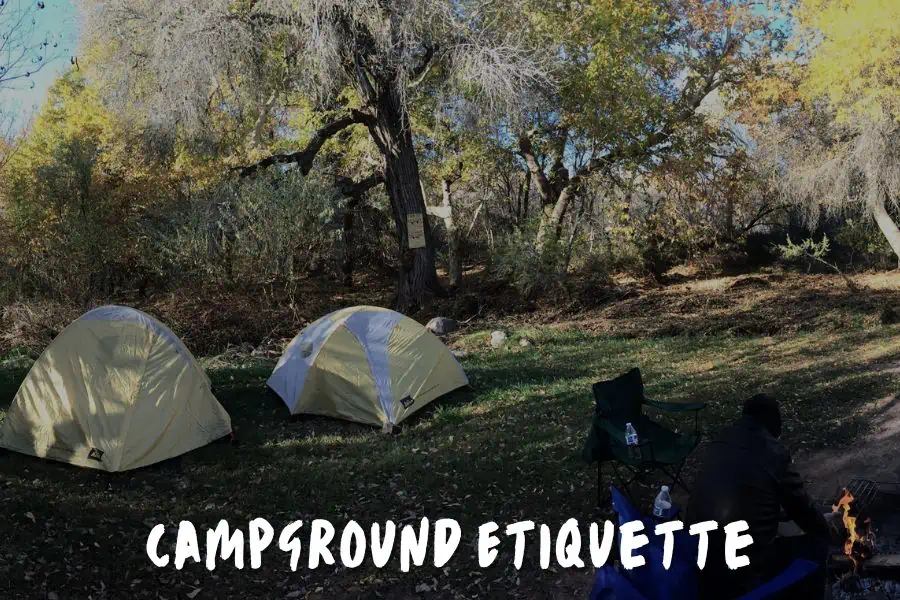
Alright, let’s talk about campgrounds, and how campers are expected to behave even before they start camping.
Reserve A Site In Advance
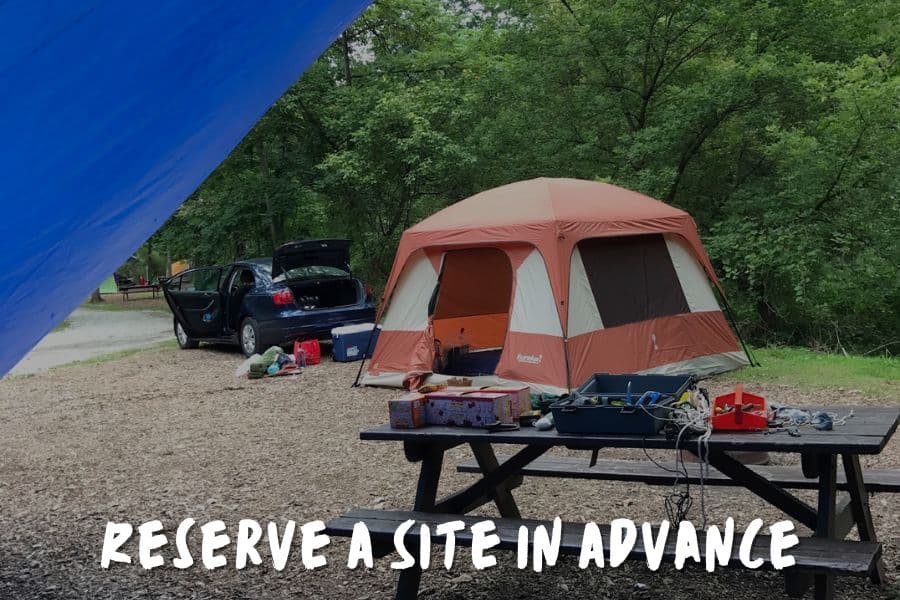
Obviously, this doesn’t count for campgrounds that work on a first-come, first-served basis.
But most campgrounds allow you to reserve a camping spot up to six months in advance.
Now, I know that not everyone can plan that many months in advance.
But keep in mind that the earlier you reserve, the better chance you have of securing the spot at the campground you want.
This is especially important if you plan on going during the camping season, as the demand is pretty high.
And while arriving at the campground without a reservation isn’t exactly considered rude, it will probably mean you won’t find an available spot.
Check For Reservation Requirements
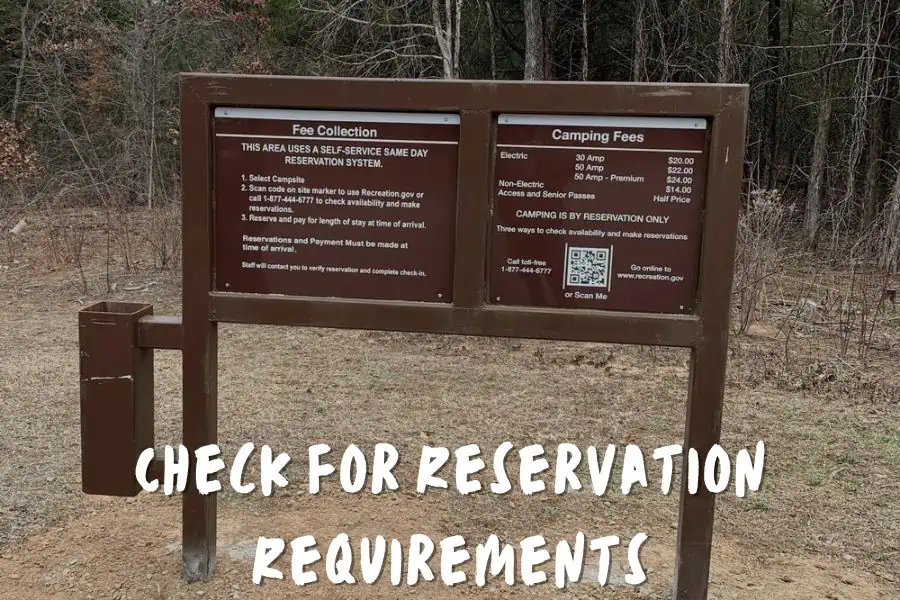
Certain campgrounds may have specific requirements, so that’s something to check out beforehand.
For instance, many campgrounds require full payment upfront and have a cancellation fee.
They might also have requirements regarding the time of your arrival and departure, so make sure you get acquainted with the rules of your campground.
Choose The Right Type Of Campsite
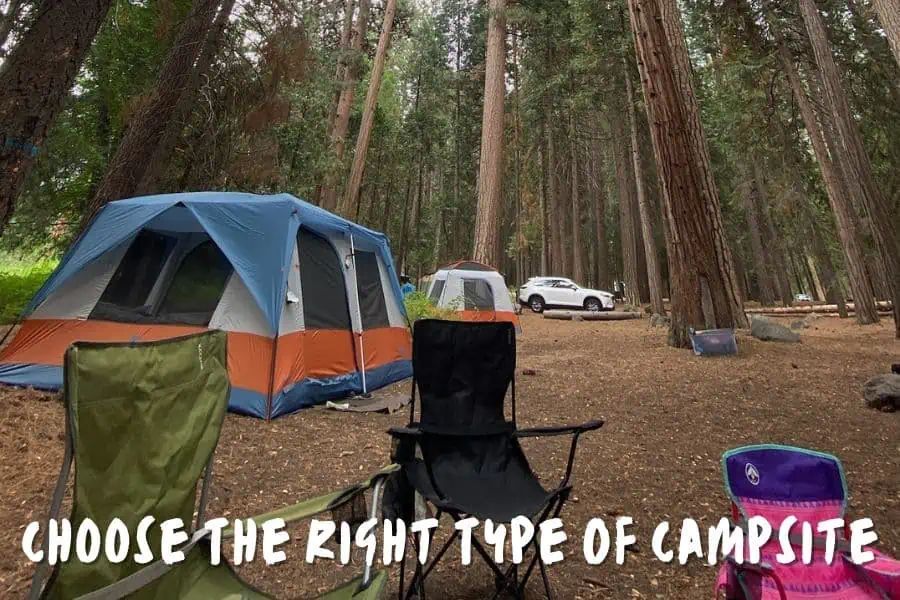
Not all campgrounds allow all types of camping. For instance, certain campgrounds are designated for RVs or tents only, while others allow sleeping in cars as well.
Whatever your shelter of choice might be, make sure to choose a campsite that allows that type of camping.
Check For Safety Hazards
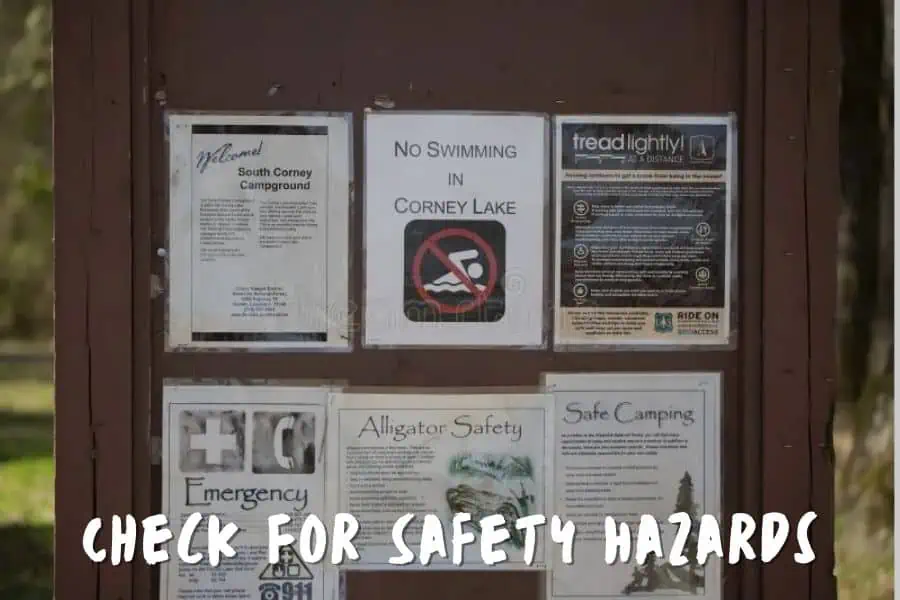
When setting up your campsite, check for safety hazards around you.
For instance, you might have secured a spot right underneath a beautiful, lush tree that makes an enjoyable shade during the day.
But if its branches are sitting low, don’t set up a campfire right underneath it.
Just a single airborne spark can set it on fire, and that can easily escalate into a disaster.
Camping Etiquette With Children
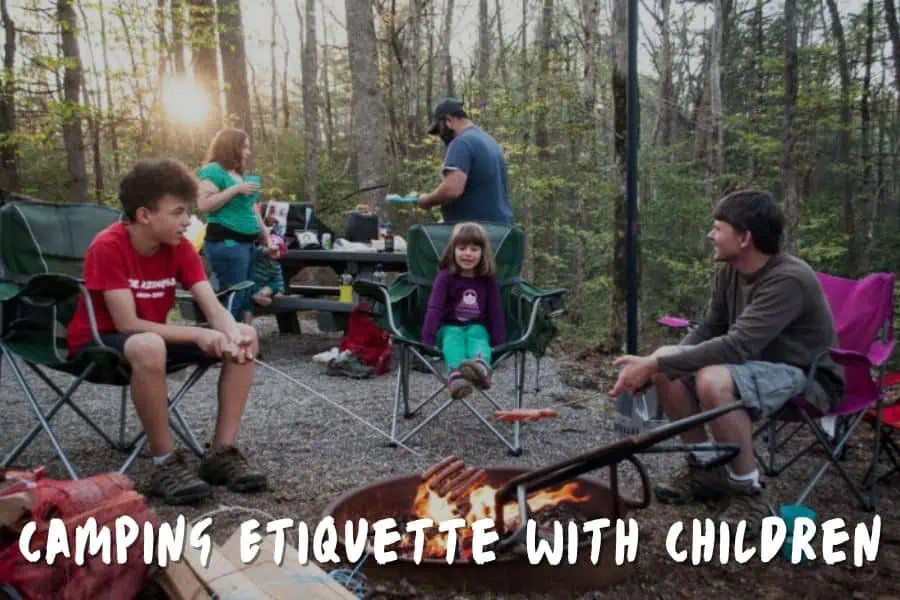
Camping is a great activity for kids.
But as a parent, you have a responsibility to make it safe and enjoyable for them – and for everyone else around them.
I’m sure that you don’t want to be the mood killer with your serious speech about things that children should and should not do as soon as you get to the campground.
That’s why you should talk with your kids beforehand about what’s expected from them.
Respect Nature
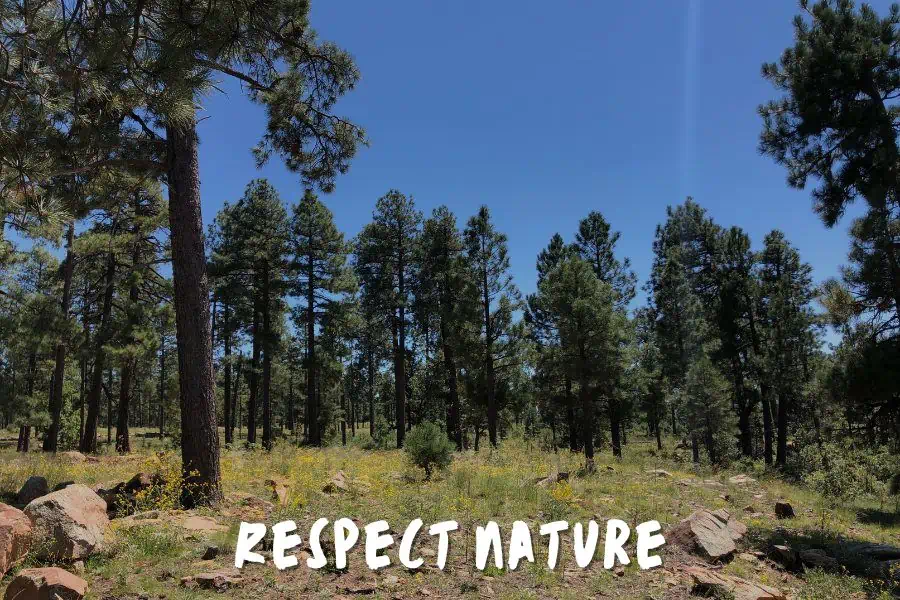
Personally, I find camping a great way for kids to develop respect for nature.
And here’s what you should do to help them learn that.
Teach Children About Wildlife Interaction
Wild animals are sure cute to see, but keeping a distance is extremely important for everyone’s safety.
For instance, while kids might not perceive bears and wolves as dangerous, you definitely know better than to approach them.
That’s why it’s important to teach your kids to stay away from animals and observe them from a safe distance.
You should also teach them that observing nature is best done from afar, and approaching wildlife, even sweet ones, can interrupt nature.
Teach Children To Minimize Their Impact On The Environment
We all should live in accordance with the Leave No Trace principles – both children and adults.
In fact, kids are at their best stage for learning and implementing these principles.
From picking up trash to leaving nature intact, it’s important that you teach your children how to minimize their impact on their environment.
Encourage Children To Respect Plant & Animal Life
Every plant and animal plays a role in the ecosystem, no matter how trivial they might seem.
But for kids, that might not be so apparent. So, while beautiful wildflowers can be turned into a flower crown, picking them is not really great for nature.
On the other hand, bugs may seem scary to kids, and stepping on them seems like a great way to avoid their dangerous attack – or so they may think.
But it’s up to you to teach them that those insects pose no danger and that killing them is not the right thing to do.
Respect Other Campers
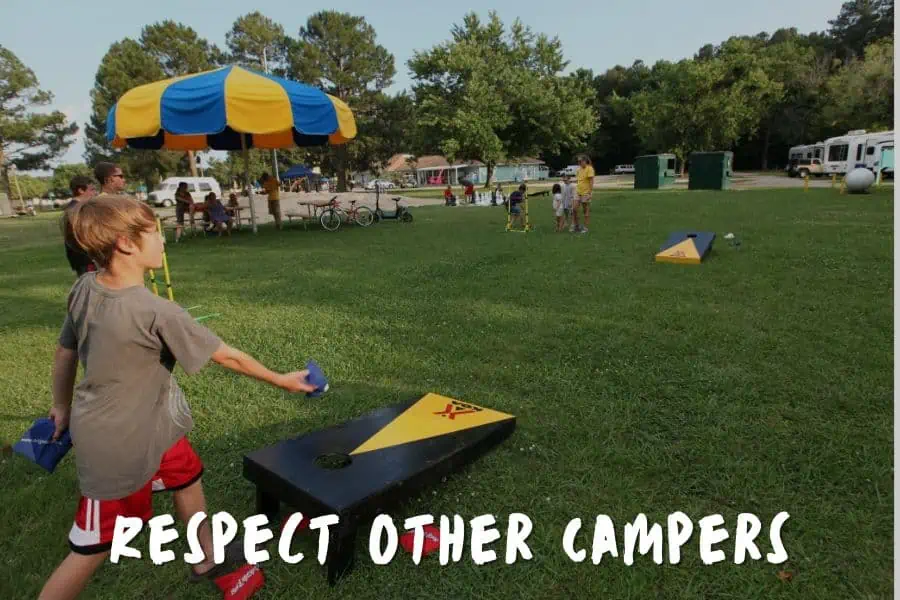
Since you’ll be surrounded by a bunch of other campers, it’s important that your kids know how they’re expected to behave around them.
Teach Children About Respecting Others’ Space & Privacy
As an adult, you know the concept of privacy. But that’s not the case with kids, especially younger ones.
That’s why they may not know it’s not okay to pass through someone’s campsite, for instance.
The same goes for using other people’s stuff. Even if they’re placed right there for everyone to see, that doesn’t mean that someone else’s property is free for use.
Given that many campgrounds are filled with children, there’s a good chance you’ll see toys like bikes or balls everywhere.
It’s important that your kids know they can’t use them without asking first.
Encourage Children To Be Mindful Of Their Noise Level
Most kids go to bed before adults. But nevertheless, they should know that they should keep their noise down, especially during quiet hours.
If they’re watching a cartoon before sleep, for instance, remind them that their volume should be lowered so that it doesn’t disturb other campers.
Not just that, but they need to know there’s a noise limit during the day, as well. This means no loud music or screaming, as no one wants to hear that.
Read: The Ultimate List Of 65+ Camping Activities You Need To Try
Model Polite & Respectful Behavior
Children see children do. The best way to teach your kids a certain behavior is to model that behavior.
While you probably don’t know people camping around you, that doesn’t mean you shouldn’t greet them when passing by and generally be polite to them.
The same goes for your kids!
Watch Campfires
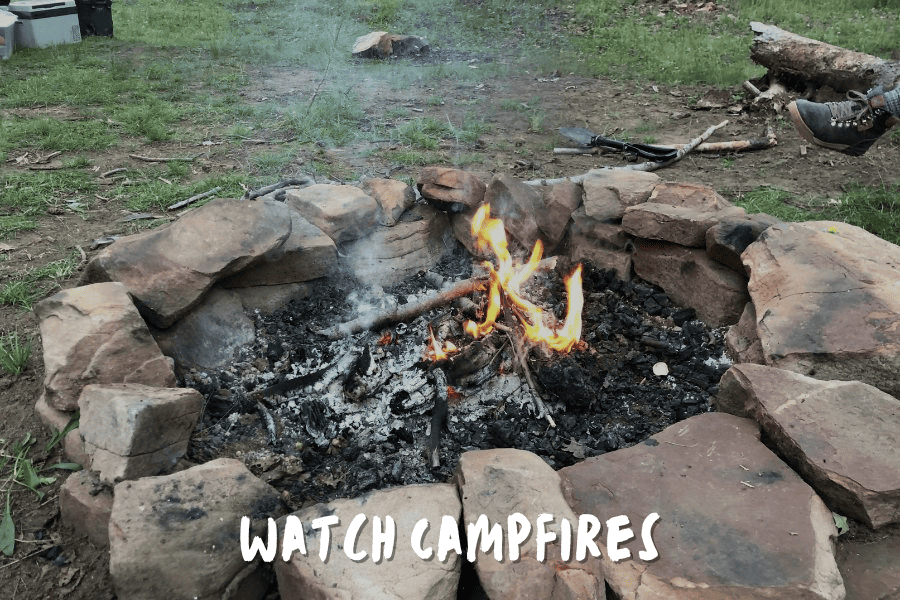
For most kids, flames appear to be “magical” and nowhere near as dangerous as they might be.
That’s why it’s your job to teach them about campfire safety.
Teach Children About Fire Safety
First and foremost, your kids need to understand that things can catch fire – that includes camping gear, toys, and even the clothes they’re wearing.
That’s why it’s important that they keep a safe distance from the actual campfire. Ideally, that means staying at least 3 feet away from fire.
You can use sticks or stones to mark the borders of their safety zone for better understanding.
Encourage Children To Participate In Gathering Firewood & Starting The Fire
Of course, fire is not all bad when safety precautions are taken, so kids shouldn’t be scared of it.
In fact, having them participate in building a campfire is fun and a great way to develop the skills that they can use on their own when older.
So, while they should stay behind when the fire is going, you can keep the kids occupied in the building process.
They can be in charge of gathering tinder and kindling, as well as positioning the wood for the campfire.
Supervise Children Around The Campfire
Even though your kids know they should keep their distance from the campfire, you should never leave them unsupervised.
They’re children, after all, so you can’t expect them to be careful 100% of the time. That’s what you’re there for as their guardian.
You can never know when an accidental ball throw can cause a fire accident, so it’s important that you’re supervising them all the time around the fire.
Read: Campfire Safety Tips: How to Stay Safe Around the Campfire
Camping Etiquette With Dogs
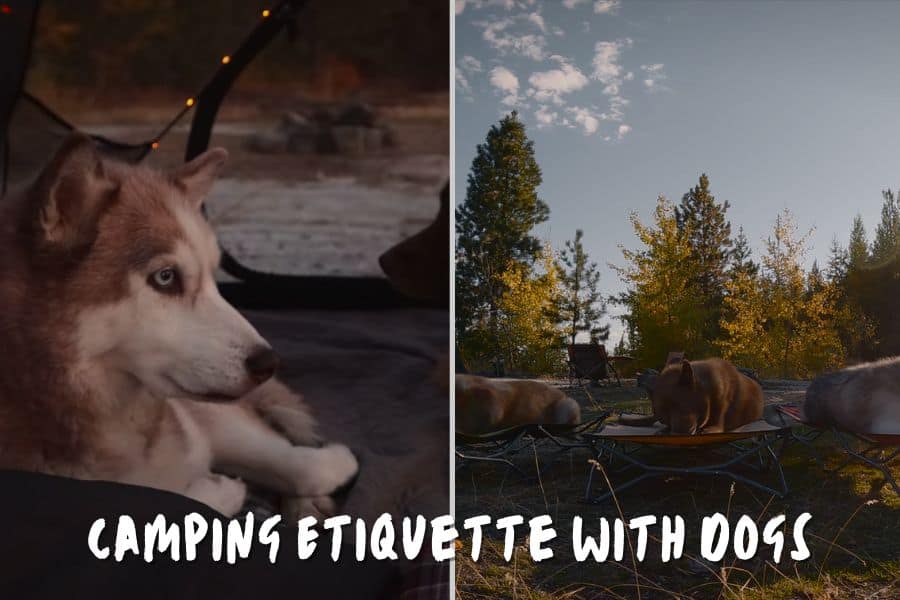
Dogs love the outdoors as much as we do, so taking them camping is an amazing chance for both of you to enjoy your favorite pastime.
However, there are a few things you should know about camping etiquette concerning dogs.
Ensure Your Dog Is Healthy & Vaccinated
Some campgrounds require dogs to be vaccinated for them to enter.
But even when that is not the case, you still want to make sure your pooch has all the necessary vaccines for enjoying the outdoors.
While rabies isn’t really an issue in urban areas, that’s not the case with wilderness.
Animals like raccoons, skunks, bats, and foxes are known to spread this disease.
Given how deadly the disease is, you need to make sure your pet is protected from it.
Train Your Dog For Camping
A campground is a new environment for your dog, so you want to make sure everything goes smoothly.
At the very least, your dog should know basic commands like “stay” or “leave it”.
That will ensure you can stop it from doing something inappropriate at the campground, be it stealing food or chasing after kids riding a bike.
Pack Enough Water & Food For Your Dog
Don’t forget to pack enough water and food for your fido for the entire camping trip.
Keep in mind that you’re spending time outdoors, enjoying different activities with your canine companion.
That means both you and your furry friend will spend more energy, so you’ll probably be more hungry as well.
Remember to pack extra!
The same goes for water. And while you can replenish your liquid loss by drinking juices, your dog can’t.
So, make sure you pack more than necessary.
Keep Your Dog On A Leash
Again, practically all campgrounds have on-leash requirements, so you need to abide by that.
It makes sense. Dogs like to roam, and they care little about the borders of each campsite.
So, they won’t mind visiting the neighbors to say hi, or even ask for a snack.
Of course, that’s not to say that your dog isn’t a good boy or a girl.
But there needs to be fair treatment for all pooches on the campground, so the on-leash rule applies to everyone.
Having dogs on leashes also prevents them from roaming away, which is for their own good.
Encountering wild animals can be very dangerous, even lethal for them.
Dogs are social creatures, I know. But the best camping etiquette for dogs is for them to learn to stay by their people and not wander off into things/places they ought not.
Control Barking & Noise
Everyone at the campground is there to rest from the city noise and enjoy the peace of the outdoors.
The last thing they want to listen to is your dog’s excessive barking or whining.
As a dog owner, I get why dogs may bark or make noise, but that doesn’t mean that even I don’t feel like listening to it sometimes.
Imagine how it is for people who were looking forward to a quiet weekend.
Be Respectful Of Other Campers’ Spaces
No matter how cute your pooch might be, other campers might not feel the same way.
That’s why you should keep your dog on a short leash to prevent wandering to other people’s campsites for a friendly visit.
Pick Up After Your Pet
No one wants to step into dog poo.
Your dog doing business is absolutely normal, but you should always pick up the poo and throw it away into a designated trash bin.
Read: Camping With Dogs
Leaving Your Campsite Etiquette
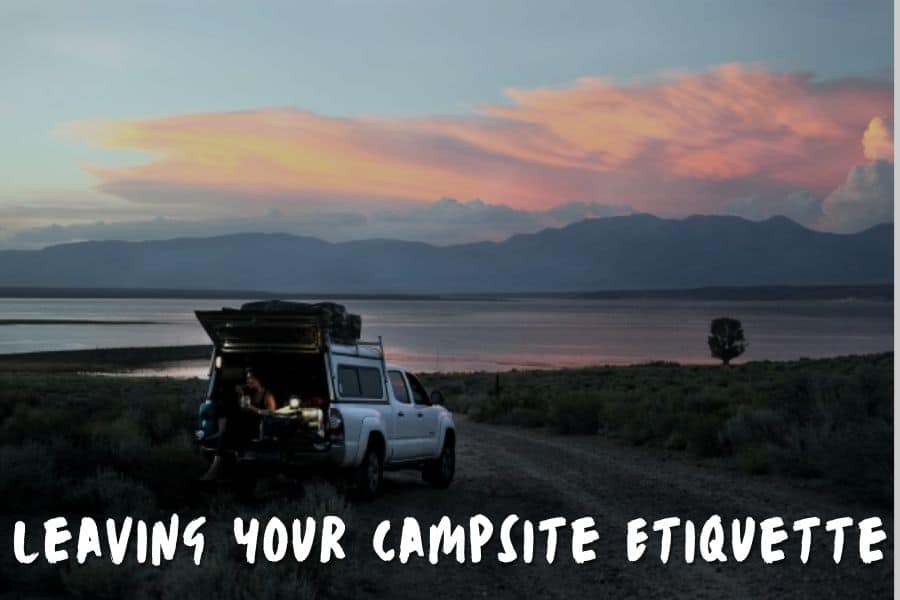
Heading home? Here’s what every good camper should do to follow proper departure etiquette:
Clean Up Your Campsite
When you’re leaving, make sure to leave nothing behind. That includes everything from trash to food scraps.
One thing you can leave behind is firewood, if it’s still good for use (i.e. not wet). That way, future campers can use it for their campfire.
But everything else has to go.
Properly Dispose Of Trash & Recycling
Pretty much all campgrounds offer designated trash bins for waste disposal.
Many of them will also offer separate bins for different types of garbage, including recyclable ones.
If they do, please make sure to separate your trash before throwing it away.
There’s no reason why we shouldn’t try to minimize our impact on the environment when possible.
Safely Store Food & Gear
Both your food and gear should be properly stored when leaving.
In the case of food, this means preventing any leakage from your bags and containers and smells that linger behind.
When it comes to your gear, cleaning it before packing is a logical thing to do. But make sure you don’t leave a mess behind.
Check For Any Damage Or Repairs Needed
This is also the best time to check for any damage to your gear, and also the best time to repair it. Why?
Well, because you might forget to do so when you get home.
And the next thing you know, it’s your next trip and you just remembered the damage while setting the tent up.
And the patch needs time to get glued completely, so you want to do that while the tent is not in use.
Leave The Campsite Better Than You Found It
Don’t just pack your stuff up. If there are a few pieces of trash around, but you didn’t put it there, that doesn’t mean you can’t pick it up.
Nature is for everyone to enjoy, so we should all do as much as we can to keep it clean.
FAQs
What Is The #1 Rule Of Camping?
Ultimately, the most important thing when it comes to camping etiquette is following Leave No Trace.
If we love the environment enough to visit it, we should care enough about it to preserve it as much as possible.
Also, when in doubt, follow the Golden Rule. Treat others around your campsite as you wish they would treat you!
What Should I Do When Arriving At The Campsite?
Ensure that you have everything you need before you start setting up your camp.
That way, if you’re missing something, you have time to go back and get that.
You want to start setting up your camp as soon as possible, especially if you arrive a little before sunset.
What Should I Do If I Arrive After Hours At My Campground?
First, make sure you’re allowed to enter the campground after hours. When entering, keep your noise to a minimum.
If driving up to a campsite, drive slowly to not disturb other campers.
How Can I Minimize My Impact On The Environment While Camping?
Leave everything as it is. Don’t pick flowers or collect stones, and don’t leave anything of yours behind.
That includes both food and trash.
Can I Bring Firewood From Home To A Campground?
You shouldn’t move firewood more than 50 miles, as it can be infected with endemic diseases that can be spread to a new environment.
Instead, always get your firewood locally.
Is It Okay To Run A Generator When Camping?
If you absolutely must, use the generator during midday, when most of the campground is awake and active.
But even then, limit the use to no more than a few hours.
Generators are loud, which can be quite annoying to listen to at all times.
Do I Need To Keep An Eye On My Kids When Camping?
Absolutely. They can easily wander away and get lost or get into some kind of trouble without supervision.
To make the trip enjoyable for both you and the kids, it’s important that you keep a constant eye on them.
Can you play music while camping?
Yes if the campground allows, and never within quiet hours….but please, please be mindful of your neighboring campers and keep the volume at a reasonable level.
What is reasonable you may ask? Walk over towards your neighbor’s campsite and if you can still hear it, it’s too loud!!
Keep in mind that your neighboring campers are likely trying to enjoy some peace and quiet and enjoying the sounds of nature.
They didn’t escape into the wilderness to hear your loud music. Not to mention, they may not even enjoy the same genre adding to the misery.
Be kind, and when in doubt, turn it off or use headphones.
To Sum Things Up
As you can see, there are certain rules (both written and unwritten) to abide by when camping.
While some of them seem unnecessary, camping etiquette is there for a reason.
And that’s to make camping as enjoyable as possible for everyone.
With such a noble cause in mind, these rules don’t seem too strict, right?


